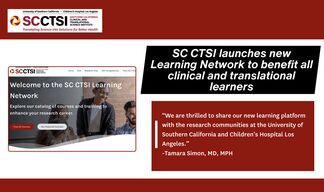SC CTSI Develops New Manuals to Help Researchers Engage Diverse Communities in Clinical Studies
Manuals provide toolkits for strategies to guide researchers as they partner with community members, recruit participants, and involve community voices in research design.
To advance its mission to close gaps in health disparities between the nation's various populations and groups through improved clinical research, the SC CTSI has developed a "toolbox" of publications to help researchers partner more productively with diverse communities of Southern California and beyond.
The 25-page booklets contain strategies, best practices and advice for engaging diverse communities and populations in clinical and translational research, said Marisela Robles, MS, Program Manager in the SC CTSI's Community Engagement program, and a coauthor of the manuals.
Why the focus on community engaged research? Despite efforts by the nation's research institutions and government bodies, clinical studies in the U.S. remain overwhelmingly White; nonwhites including Latinos, Asians, and African Americans, make up a disproportionately small percentage of research participants.
"The underrepresentation of minorities in research is an important contributor to health disparities," said Robles. "The dearth of clinical data specific to different populations and communities often leaves doctors and researchers with insufficient data about biological and cultural variations that can play a role in disease and treatment outcomes."
Real-world guidance for developing community-engaged research.
Clinical researchers rarely receive guidance in community engagement (CE) during their schooling or post-degree training, nor are they typically familiar with the growing body of research on campus-community partnerships, explained Katrina Kubicek, PhDc, Associate Director of the SC CTSI's Community Engagement program, also a coauthor of the manuals.
"The manuals are a concise but complete overview of the community engagement process that researchers can use as they seek to establish relationships with populations that have traditionally remained outside the world of clinical research," said Kubicek.
Three toolkits have been completed so far, with two more forthcoming. Available now are the following:
- Toolkit for Developing Community Partnerships — Introduces the key concepts, practices and strategies in community-engaged research, outlines the potential contributions of CE to successful clinical research, includes case studies, discusses career issues for researchers, and more.
- Tips and Tricks for Successful Research Recruitment: A Toolkit for a Community-Based Approach — Provides nuts-and-bolts advice to prepare researchers for success in CE, including goal-setting, listening to participants, compensation for individuals and organizations, communication, recruitment challenges, keys to participant retention, and more.
- Integrating Community Voices into a Research Study: Community Advisory Board Toolkit — Discusses formation and activities of Community Advisory Boards (CAB), including identification of potential members, staffing, research question development, CAB meeting facilitation, meeting materials and logistics; includes sample CAB member agreement, partnership letter, other documents, and more.
Two forthcoming publications will cover the topics of cultural competency and of dissemination avenues.
CE is a boon for research studies.
Engaging long-overlooked populations is not only good for public health, it benefits research studies, which frequently struggle to achieve adequate participant enrollment. According to one analysis, nearly 20% of studies were either terminated for failed accrual or completed with less than 85% expected enrollment. CE is a powerful tool to help boost and retain participation.
The SC CTSI provides a number of resources, training and consulting services to assist researchers with community-engaged research.



